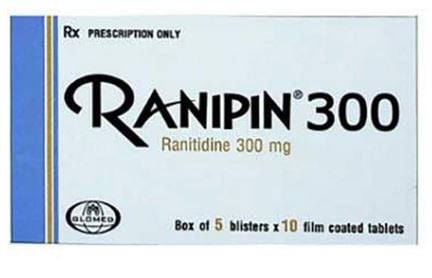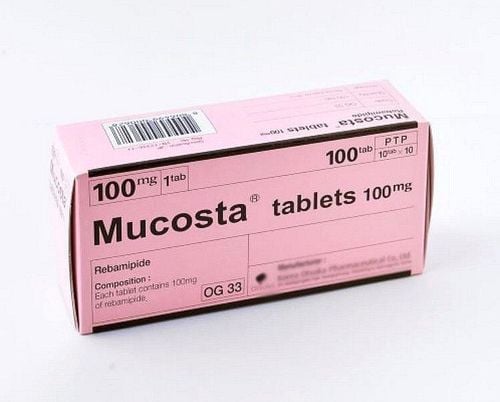This is an automatically translated article.
Ranistad 50mg is prepared in the form of 2ml ampoules, the main active ingredient is ranitidine hydrochloride. The drug is indicated in the treatment of peptic ulcers, postoperative ulcers, reflux esophagitis, Zollinger-Ellison syndrome.
1. What is Ranistad?
Ranistad 50mg is prepared in the form of 2ml ampoules, ingredients containing Ranitidine hydrochloride equivalent to Ranitidine 50mg. The drug works to reduce the amount of gastric acid secreted both day and night, in the state of being stimulated by food, insulin, Amino acid, Histamine or Pentagastrin. The inhibitory effect on gastric acid secretion of Ranitidine is 3 to 13 times stronger than that of Cimetidine.
Ranistad 50mg is indicated for people who are being treated at the hospital and cannot take drugs in subjects with peptic ulcers, postoperative ulcers, reflux esophagitis, Zollinger-Ellison syndrome. In addition, the drug is also used in the prevention of gastrointestinal bleeding, stress ulcers in critically ill patients, prevention of recurrent bleeding in patients with bleeding peptic ulcers, and prevention of peptic ulcers. prophylaxis before general anesthesia in patients at risk for acid aspiration (Mendelson's syndrome), especially in pregnant women in labor. It is also used in kidney transplant patients.
2. Dosage, how to use Ranistad 50mg
Adults:
Treatment dose: 50mg intramuscularly every 6-8 hours; either by slow intravenous infusion (over 2 minutes) 50 mg after dilution to 20 ml, every 6 - 8 hours or by intermittent intravenous infusion at a dose of 25 mg/hour, may be repeated after 6 - 8 hours. Prophylaxis of bleeding from stress ulcers or prevention of recurrent bleeding in patients with peptic ulcers: 50 mg by slow intravenous injection, followed by continuous intravenous infusion at 125 - 250 μg/kg/hour, followed by oral Ranitidine 150mg twice a day when the patient started eating. Prophylaxis of acid aspiration in Mendelson syndrome: 50 mg intramuscularly or slowly intravenously 45-60 minutes before general anesthesia. Children: Dosage has not been determined.
3. Use Ranistad 50mg with caution
It is necessary to reduce the dose in patients with renal failure because the drug is excreted by the kidneys, the concentration of the drug in the blood plasma will increase. The usual injection dose is 25mg or just 1 dose of 500mg in the evenings for 4-8 weeks. Increased risk of overdose and side effects in people with severe liver failure, acute porphyria. Risk of heart failure in people with heart disease. Masking the symptoms of stomach cancer and delaying the diagnosis process, it is necessary to eliminate the possibility of cancer before starting treatment. Rapid injection may cause bradycardia, which is common in people with predisposing factors for arrhythmias. Use with caution in pregnant and lactating women. The drug should not be used while driving or operating machinery because of the dangerous side effects of headache and dizziness during work.
4. Contraindications Ranistad 50mg
Ranistad 50mg is contraindicated for people who are sensitive to the ingredients of the drug.
5. Drug interactions
Some interactions that may be encountered when using Ranistad with other drugs include:
Ranistad very rarely inhibits hepatic metabolism of some drugs such as Cumarin, Theophyllin, Diazepam, Propranolol, enzyme inhibitory level. liver is 2-4 times less than Cimetidine. There is a possibility of hypoglycaemia when used with Glipizide but not much. The antibiotic Enoxacin is reduced in bioavailability when co-administered with ranitidine, but is of little clinical significance. Ketoconazole, Fluconazole and Itraconazole are reduced when used with Ranitidine due to decreased gastric acidity. Combination with Clarithromycin causes increased plasma concentrations of Ranistad. Peak serum concentrations of ranitidine are increased when administered with propanthelin bromide.
6. Ranistad 50mg . side effects
Possible side effects during treatment with Ranistad include:
Common: Headache, dizziness. weakness, diarrhea, erythema. Uncommon: Leukopenia, thrombocytopenia, increased transaminases, pain at the injection site. Rare: Urticaria, angioedema, bronchospasm, anaphylactic shock, myalgia, arthralgia, bradycardia, hypotension, gynecomastia in men, pancreatitis, hepatitis sometimes with jaundice, eye accommodation disorder.
7. Overdose and treatment
An overdose of Ranistad is unlikely to cause particularly serious problems. There is no specific antidote, so symptomatic treatment is encountered, monitoring is the solution used mainly when overdose occurs:
Convulsions using intravenous Diazepam. Bradycardia Atropin injection. Lidocaine injection ventricular arrhythmias. Hemodialysis the drug from the plasma. The article has provided information about the uses, doses and precautions when using Ranistad 50mg. To ensure safety for your health and maximize the effectiveness of your treatment, you need to take Ranistad 50mg exactly as directed by your doctor.
Please dial HOTLINE for more information or register for an appointment HERE. Download MyVinmec app to make appointments faster and to manage your bookings easily.













